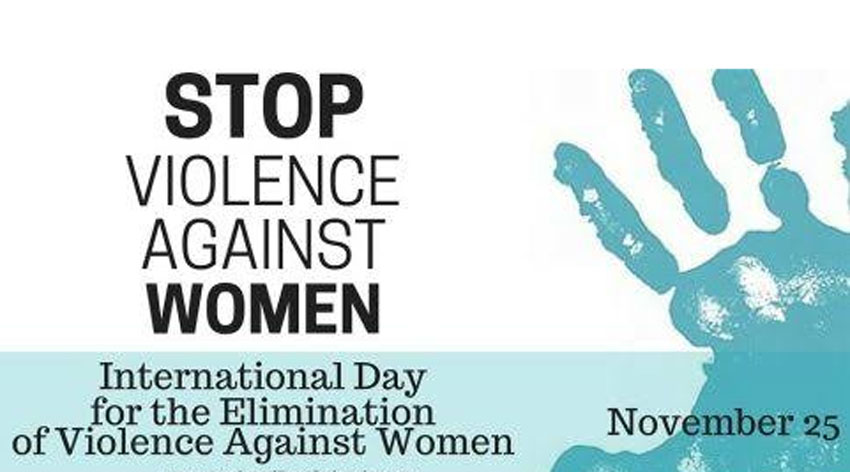
Message from the Caribbean Family Planning Affiliation in Observance of the International Day for Elimination of Violence Against Women
25 November marks the International Day for the Elimination of Violence against Women and kicks off 16 days of activism to stop gender-based violence (GBV). The Caribbean Family Planning Affiliation (CFPA) joins the rest of the world in calling for governments to take urgent action to ensure discriminatory laws and practices are reviewed, and to implement policies and mechanisms to enable women to access justice, support and provide the necessary tools to combat this horror that plagues their lives, families and the entire region.
Violence against women remains pervasive and far too often a fatal phenomenon across the Caribbean with severe consequences for women and children, and also negatively impacting men, some of whom commit suicide, after murdering their partners and /or their children. GBV has harmful effects on a child’s mental, emotional and physical health with long term impact, which can result in boys modelling the abusers’ behaviour and becoming perpetrators of GBV.
GBV is most commonly committed by an intimate partner or family member. The World Health Organization (WHO) estimates that globally 35% of women have been victims of physical and/or sexual violence at some point in their life, typically by an intimate partner. As of December 2014, the total number of women who were murdered in Latin America and the Caribbean had increased to 1,906 cases (ECLAC) with 38% of the cases resulting from domestic violence (WHO).
GBV has serious health challenges for women, whose vulnerability can increase, losing their ability to control their reproductive health. Women who live in abusive situations often have less ability to negotiate the use of condoms or other contraceptives in order to protect themselves. They become exposed to sexually transmitted infections (STIs), including HIV and unwanted pregnancy.
A woman who has been raped carries the trauma of the violence and often has to deal with an unwanted pregnancy. With the exception of Barbados and Guyana, women in the English speaking Caribbean are further violated by restrictive laws and policies, which limit their reproductive choices and put them at severe health risks and high susceptibility to a never-ending cycle of violence. A woman with an unwanted pregnancy, especially resulting from rape, usually has an urgent need to terminate her pregnancy, even if safe and legal abortion options are unavailable. In this situation, she is put at high risk for complications, including debilitating injuries and death.
The Caribbean Family Planning Affiliation, which is a member of the International Planned Parenthood Federation (IPPF), has a high priority on the right of a woman to choose and decide what to do with her body. Ending gender-based violence and reproductive injustices are key steps in transforming the lives of women and girls. Family Planning Associations across the region work to provide women, girls and also men and boys with quality rights-based services, counselling and education, including age-appropriate comprehensive sexuality education.
Today, we join with women and girls who cry out from the terror of GBV and gender injustices, calling on our governments to accelerate actions towards the 2030 Agenda, with attentiveness to gender justice and equality goals that address critical issues affecting the lives of women and girls, such as gender-based violence, sexual and reproductive health and rights, adolescent pregnancy, the feminization of poverty, including unpaid care work, and climate justice.
Women’s Rights and Youth Organisations need to be strengthened to take leadership in transforming the region’s unjust heteronormative and patriarchal social norms which police and stigmatize women’s sexuality, and prevent women and girls from seeking and accessing the information and services they need to protect themselves and live a healthy life.
The advancement of our societies will be quashed if we fail to ensure that women and girls are assured of a life free of violence, and are free to fully exercise their sexual and reproductive rights.
#stopgenderbasedviolence #standagainstrape
WHAT IS PANCAP?
PANCAP is a Caribbean regional partnership of governments, regional civil society organisations, regional institutions and organisations, bilateral and multilateral agencies and contributing donor partners established on 14 February 2001. PANCAP provides a structured and unified approach to the Caribbean’s response to the HIV epidemic, and coordinates the response through the Caribbean Regional Strategic Framework on HIV and AIDS to maximise efficient use of resources and increase impact, mobilise resources and build the capacity of partners.
What are the Global AIDS Strategy 2021–2026 targets and commitments?
If targets and commitments in the strategy are achieved:
- The number of people who newly acquire HIV will decrease from 1.7 million in 2019 to less than 370 000 by 2025
- The number of people dying from AIDS-related illnesses will decrease from 690 000 in 2019 to less than 250 000 in 2025.
- The goal of eliminating new HIV infections among children will see the number of new HIV infections drop from 150,000 in 2019 to less than 22,000 in 2025.
What are the 95-95-95 Targets for ending AIDS?
- 95% of People Living with HIV know their HIV status;
- 95% of people who know their status on treatment; and
- 95% of people on treatment with suppressed viral loads.
HELPFUL LINKS:
Global AIDS Strategy 2021–2026, End Inequalities, End AIDS
https://pancap.org/pancap-documents/global-aids-strategy-2021-2026-end-inequalities-end-aids/
Caribbean Regional Strategic Framework on HIV and AIDS (CRSF) 2019-2025
https://pancap.org/pancap-documents/caribbean-regional-strategic-framework-2019-2025/
